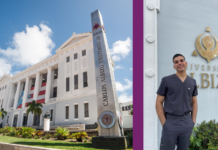M
ore than a year has passed since the whole world was shaken by a deadly and contagious virus that forced a large part of humanity to lock itself indoors. The world is now watching hopefully as the vaccines developed to contain the spread of the disease continue to advance. But at the same time, we are seeing spikes in the deadly advance of the virus that suggest that a life without COVID-19 will not be possible for several years.

Accepting this as a new reality forces us to look at the behavior of a society that has been subjected to a prolonged threat and forced to radically alter its way of life. Therefore, the mental health of humanity will, in all likelihood, be a key issue in the near future for healthcare professionals, researchers, governments, and societies. To gain some insight on what is already known and has been analyzed regarding the mental health of a pandemic-affected population, we approached Dr. Isaac Tourgeman, Ph.D., MS., Assistant Professor of the Psy.D. doctoral program in Counseling Psychology at Albizu University in Miami and asked him some questions.
It is already known that, as a result of the change in life routines, isolation, fear of getting sick, and the loss of loved ones due to this illness, part of the population has developed issues such as anxiety, depression and, in certain cases, post-traumatic stress disorder, as well as other disorders related to trauma and stress. Tourgeman explains that it is to be expected that the general population will experience an unbalanced mental state.
“We will see an increase in mental health issues simply because there is an added stressor, which raises the likelihood of progression to mental health disorders that are more or less severe. In the case of people with a history of mental health disorders, the likelihood of exacerbating existing conditions is greater. This could lead to the condition becoming chronic.”
“We will see an increase in mental health issues simply because there is an added stressor, which raises the likelihood of progression to mental health disorders that are more or less severe. In the case of people with a history of mental health disorders, the likelihood of exacerbating existing conditions is greater. This could lead to the condition becoming chronic.”
Tourgeman goes on to say that “having to deal with multiple adverse situations simultaneously takes its toll on the ability to cope with problems. And that is precisely what the pandemic has brought: many stressors acting simultaneously as well as cumulatively.”
In fact, something that characterizes the virus as a major stressor is that, to a greater or lesser extent, it has practically affected the entire population. Regardless of the level of exposure to the virus, the measures taken to curb infections have affected everyone. However, Tourgeman warns that “there are some groups that are particularly vulnerable to burnout or exhaustion. In the case of healthcare professionals, we can already be talking about a considerable number of cases of burnout due to long working hours and the stress of knowing you are constantly exposed to danger. This can manifest itself as fatigue, increased reactivity, loss of appetite, and other symptoms associated with depression. The effects can also be perceived in people who feel overwhelmed by a sense of pessimism, of little hope that there will be positive changes in the current situation we live in. And of course, that can be a prelude to more serious conditions.”
However, society in general is experiencing a certain level of fatigue, explains the professor. “The prolonged imposition of certain restrictions, the length of time we have been feeling directly threatened, consumes people. Simply hearing and seeing information on the same topic constantly, over and over again, causes fatigue, which can lead to a deterioration of our mental and emotional balance.”
Some areas are still reporting high numbers of infections and deaths, and despite progress in vaccine development, the battle against the pandemic continues. For this reason, it is too early to determine the levels at which the incidence of mental health disorders related in some way to the effects of the pandemic might increase. But it is already being studied.
Something else that is being discussed is the possibility that a mental illness pandemic could result from the COVID-19 pandemic. Dr. Tourgeman explains that we will see an increase in cases of depression, either caused or exacerbated by the crisis we are facing. “We can also expect a higher incidence of disorders such as panic attacks and hypervigilance, linked to the constant fear caused by the virus: that anyone can be sick and infect you.”
Aside from the imminent increase in moderate mental health disorders predicted from the effects of the pandemic, it has also been suggested that the pandemic itself can be considered a traumatic event. For example, an online survey conducted in Italy showed a relatively high percentage of post-traumatic stress symptoms (PTSS) related to the pandemic. Dr. Tourgeman points out that “the necessary restrictions and the general concern brought on by COVID-19 may trigger this type of trauma-related response. Furthermore, there is a significant group of people who have lost one or more loved ones to the virus, which can make the pandemic a traumatic event to the extent that it is associated with grief and loss.”
“The fear of getting sick, the isolation, the changes brought on by restrictions, and the loss of resources and opportunities, added to the loss of lives, have compounded into a perfect storm that has uncovered concerns, disorders, and reactions that lay beneath the surface. And all of this has provoked stress in humanity as a whole. The hope now is that the administration of the vaccine will help us regain the control that we feel we have lost.”
But let us remember that the stressors of the pandemic are still present, even when some families have not lost loved ones. It may also similarly affect those who have become ill with the virus but have recovered, and those who have seen multiple cases of infection in their immediate environment. Dr. Tourgeman explains that the way the virus spreads “has given rise to a deep sense of vulnerability, of understanding and fear that anyone can become infected with the disease. For those who have had the virus, it makes them feel that they have lost control, and that there is little or nothing they can do to change their situation. If it is a loved one who becomes ill, those closest to them feel unable to help. For the general population, the pandemic has triggered an overwhelming sense of helplessness in the face of a problem that is causing such distress and anxiety.”
“The whole world is suffering from stress,” adds Dr. Tourgeman. “The fear of getting sick, the isolation, the changes brought on by restrictions, and the loss of resources and opportunities, added to the loss of lives, have compounded into a perfect storm that has uncovered concerns, disorders, and reactions that lay beneath the surface. And all of this has provoked stress in humanity as a whole. The hope now is that the administration of the vaccine will help us regain the control that we feel we have lost.”
But while the vaccination process runs its course and the behavior of the virus is observed, the population continues to be exposed to stressors, and it is this prolonged exposure that can lead to complications. Dr. Tourgeman says that PTSS is to be expected because “humans react to stress, but there is no exact indicator that establishes when prolonged exposure to stress may trigger a chronic condition.”
“In moderate cases, you may see symptoms such as fatigue, a feeling of uselessness, and a distrust of testing processes, medical treatments, or even the vaccine. Anxiety and sadness associated with isolation may also be observed. In many cases, the effects of prolonged exposure to a stressor can manifest as anxiety that does not prevent you from functioning as an individual, working, or performing daily tasks. But even as you continue to do so, it does not go away; it persists.”
In other cases, however, the reaction to the trauma affects the individual’s functioning, and it may lead to the abandonment of responsibilities. “That response can provoke severe feelings of anxiety or panic at specific moments, such as bedtime. It may cause the person to become isolated, feel drained of energy, or sense that they must fight or flight from the situation. And those may be signs of a more severe syndrome or disorder that needs to be observed closely,” Dr. Tourgeman explains.
Because of the way the virus has spread and how response efforts have been managed across the globe, virtually the entire population has been exposed to the stressors associated with COVID-19. However, for people already suffering from mental conditions, there is a greater risk of the condition spiraling out of control or of a developing condition to finally manifest itself.
Finally, studies on the effects of other respiratory viruses have shown that a large number of patients who suffered and survived SARS (Severe Acute Respiratory Syndrome) and MERS (Middle East Respiratory Syndrome), and who were in intensive care, suffered from PTSD (39%), depression (33%), and anxiety (30%), during the six months following discharge.
Researchers in Italy anticipate that something similar is happening with COVID-19 patients. Dr. Tourgeman concurs with this assessment. “The way we handle pandemics has not changed. Isolation and protective equipment to avoid infection were also methods used in previous pandemics recorded in history. But there are other factors that make this situation different, access to information being one of the most important. The intake of social and traditional media content, as well as the availability of continuous and constant information, influences the state of mind and we must continue to observe because it is not a phenomenon of the pandemic, but a symbol of these times.”
It can be confirmed without exaggeration that mental health will be one of the next major concerns associated with COVID-19. How human behavior adapts, reacts, and reformulates its interactions after the crisis could in many ways usher a new era for the entire world. Mental health professionals face a historic challenge and opportunity.






























